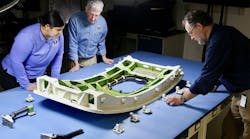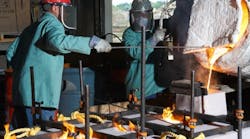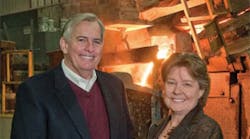Dennis Dotson was born to lead a foundry, though that wasn’t always clear to him and the results weren’t always so positive. But, there is a critical difference between inheriting a title and extending a legacy, and it is the latter which has earned Dotson a place in the FOUNDRY Management & Technology Hall of Honor. His leadership, and in many critical ways his transformation, of The Dotson Co. stands as a singular achievement in metalcasting and a ready example of the viability of foundries now and in the future.
The Dotson Co. is a 134-year-old gray and ductile iron jobbing foundry in Mankato, MN, frequently recognized for its design capabilities, highly regarded for its technical standards, and well appreciated by customers for its product quality and service. Denny Dotson would quickly emphasize that all this is the result of 140 people working hard together, with trust and a sense of purpose.
But, it is the result of effective leadership. “He practices a style of empowering others to make dreams reality,” according to one who has worked with him over many years. “He thinks ‘big’ and is always looking out ahead for the next opportunity, the next exciting challenge.”
Another colleague calls Denny Dotson “the ‘ultimate visionary’, … a risk taker. He fully comprehends the value of the human element in business.”
From the Beginning
As the son and grandson of foundry owners, Denny Dotson cannot remember a time when he was unaware of the family business. As a child he played in the sand piles there, and later he used pattern-shop tools and materials for hobbies or other adolescent schemes. As a young man he did the hard work, too; exhausting 10-hour days as a squeeze molder left him with no desire for foundry work.
Dotson’s mind was on business. He graduated from the University of Notre Dame and then earned an M.B.A. at the University of Chicago with no specific plan or even a particular type of business career in mind, but “I was pretty confident in whatever I was going to do,” he recalls now.
“When I was at Notre Dame I started a student chapter of an international organization that located jobs, summer internships, for foreign students… . So, I would go around and talk to small private companies, or even very large companies … They were all really quite fascinating but it struck me that life was going to be an awful lot more interesting at a small company than at a really large company.”
After service in the U.S. Navy the lure of the foundry business became clearer to Dotson, but he felt he needed more specific training. Foundry Educational Foundation president Ed Walsh recommended that he study engineering and metallurgy, and during a year at California Polytechnic University he visited West Coast foundries, seeking insights to how the metalcasting business should be done.
“At small businesses, the owners and the CEOs always had a lot of time to talk with me,” Dotson recollects. “I never had anyone turn me down. I’d say, ‘I’m going to school here, I’m part of a family foundry, and I’d like to visit your foundry…’ — and every one of them was just very open to my visits.”
He returned to Mankato in 1973. “My father said: ‘Go find a place to work, and if you want to, give yourself a title.’ He absolutely never told me what to do. I think that’s probably the best education to be a CEO,” he says, reasoning that running a business required him to set his own agenda. Dotson also credits his father with teaching him to manage people with patience, but never indecisiveness.
That would be important soon enough, because though the 1970s had some historically profitable years for foundries, it was what Dotson calls “a once-in-a-generation business cycle.” When his father passed away in 1978, he assumed the leadership of The Dotson Co. as its president.
The early 1980s recession was a punishing time for manufacturers, including The Dotson Co. “From my standpoint,” he recalls, ”nothing stands out as much as 1981, when the economy turned: For a five-quarter period our sales went down every quarter, so that by the fifth quarter we had sales of only 20% of what we had five quarters earlier — down 80%. And it took 10 years, until 1990, before our sales equaled our 1980 sales.”
Now the need for agenda-setting leadership was critical. Relying on his familiarity with the plant’s union workers, he proposed wage adjustments to save costs. “They overwhelmingly turned me down,” he recollects, “and I couldn’t believe that, with the individuals that I had known and had worked with, that I couldn’t sell it. What was I doing wrong?”
Three months later, Dotson Co. cut wages in half, with a clear promise to repay the lost pay with interest, and no profit-taking. “We were incredibly consistent in all that,” he states. “They wouldn’t raise their hand to adjust the contract, but they all responded when we took decisive actions and spent a great deal of time explaining the reasons.”
“I watched Denny manage through those years,” reflects Jean Bye, who replaced him as president of The Dotson Co. last January, “and he did the most incredible job that you can imagine in terms of working with all the stakeholders, and getting them to buy in, getting the employees to participate with wage cuts and getting vendors to participate, too. And then turning it around and making everyone whole after the fact.”
Building Trust
Today, Dotson admits it was “somewhat humbling” to see the foundry’s workers build trust in his leadership, but he also noticed that they appreciated the ability to contribute to the company’s survival. Now, he calls it an “accident of design” that he recognized they could have such an impact. “It’s always frustrated me when plants close when they haven’t led, gone to employees and said this is what we’re going to do, what we have to do,” Dotson says. “That time period, and how we communicated with the employees during the whole thing, really had a huge impact on my life.”
He had long appreciated the rewards of running a small company, and he’d acquired the knowledge to oversee a metalcasting operation, but during the struggle to survive Denny Dotson began to understand the importance of communicating with the employees. Their initial rejection of his wage proposal made him realize that employees and managers must trust each other, and that to build that trust the communication between them must be constant.
“They said: ‘Your coming to us when you say your not making money, and you never talk to us when you’re making money’,” he recalls. “ ‘And you never share any information with us when you’re making money.” He agreed, so “from that day on, every employee in the company has known exactly how much money we’re making, where the margins are, and for the most part what we’re spending money on.”
Even though he had gained their support, Dotson had to continue pushing the foundry forward. “I learned that you can probably do almost anything if you will lead, and take some risks,” Dotson says of the 1980s. On the brink of bankruptcy, with negative net worth, Dotson managed to gain financing to convert from cupola melting to electric furnaces. And, he persuaded customers to consolidate their casting orders and pattern work at Dotson Co.
With the market changing around the company, Denny Dotson started to redefine Dotson Co. It had been a multi-purpose foundry for decades, but he recognized that two-thirds of its operating costs were supporting just one-third of its revenues. In 1983 it closed its brass and aluminum foundry, steel foundry, and machine shop, and discontinued a line of trip hammers it had produced for nearly a century. At the same time, Dotson Co. invested in new melting and molding equipment for ductile iron, using labor-cost savings and improving productivity (up to 120 melt tons per day) as the basis for its return to profitability.
Soon, Dotson Co. instituted a program of ongoing recapitalization. Major equipment purchases and expansions were completed in 1989, 1991, 1995, 1997, 1999 and 2000. “It doesn’t do you much good to hold off everything and then spend $2 million or $3 million on one project, and then not do anything else for a while,” he reasons. The ongoing upgrades pace the overall improvements, and remind the workforce that there are better times ahead — and that those include them. “Employees want to be part of an organization that’s moving and growing,” Dotson explains. That is the logic behind Dotson Co.’s $10,000 Program: any investment valued at $10,000 or more must be studied and approved by a team of frontline workers.
Jean Bye explains that Dotson’s philosophy is to keep everyone in the organization advancing, steadily. “If you try to take big steps, it’s too much for people; you hit resistance. But, if you have your eye on a goal, and you just keep moving toward it in continuous small steps, you get there without all the pain that comes with big upsets. And, it also gives you time to correct your course in little steps along the way.”
In this way, Dotson Co. proceeded to adopt value-adding capabilities like machining, painting, plating, balancing, and heat-treating, combating the commoditization of its products resulting from global competition. The foundry demonstrated a knack for technical innovation, too: it installed North America’s first automatic CNC grinding line for lower-volume castings in 2002. In 2004 it added the market’s first automatic molding and pouring line for jobbing castings, with automatic core setting so it’s capable of completing up to 160 molds/hour. In 2006, Dotson Co. added nine conveyors, so that products flow continuously from the pouring stage through to a new shot-blasting machine capable of processing a mix of castings.
New technology and automation help Dotson Co. stay competitive, but it challenges the organization to maintain control over the equipment and processes. Denny Dotson’s insight is that the technology keeps the foundry producing, but the employees keep it performing. Cross-training brings the two objectives into alignment. “One of the things that happens when you automate is that you find yourself with many fewer choices,” Dotson explains. By cross training workers to be “vertically integrated,” i.e., capable of performing well in jobs up and down the production sequence, the foundry gains the “ability and agility” to improve its results.
“If an employee has a sense of vertical integration,” Jean Bye elaborates, “they understand, and have more confidence in their knowledge of, that which happens both before and after their specific task.” They can contribute insights or suggestions that support Dotson Co.’s commitment to lean manufacturing.
More important, cross-training keeps the latest generation of workers engaged with the organizational objectives. “They want to be challenged,” he says. “They want variety. If an organization isn’t set up to provide that variety, I don’t see how you’re going to hire a 22-year-old today and tell him ‘you’re going to pour iron until you retire.’ They want to pour iron today, mold tomorrow, and learn how to make cores, too.”
Dotson emphasizes that for foundry employees, as for everyone, “the ability to learn new things is very important.” Thus, Dotson Co. encourages its workers to pursue supplemental education and training, and it supports those efforts financially. “No matter what they’re doing, if he or she comes in to work and is excited about what they’re doing, it’s that excitement that we’re trying to promote throughout the organization.”
Linking People and Technology
The Dotson vision links people and technology, but coordinating them effectively is the leadership challenge. “You see where you want to go,” he reflects, “and you want to get there quickly, but technology is moving so fast, and one of the mistakes that we make is putting in technology that exceeds the capability of the people in their current positions.
“You have to improve incrementally,” he concludes “We all want to do this in bigger steps, but it’s the little steps that show the progress.”
He recognized how far Dotson Co. had progressed once he pulled back his own daily involvement with the foundry. He was named a trustee of the Minnesota state college and university system, which required his intermittent absence from the plant. “I specifically never told people what days I was going to be gone,” Dotson explains. “My hope was that they would decide on their own” how to proceed with the daily operations. Again, he had to be patient, but by the third year of his trusteeship he could see proof that the managers were taking such responsibility.
And, he was delighted. “These are all important cultural changes in an organization. Culture eats strategy for breakfast,” he jokes. “You’ve got to work on the culture first, and then you can align around a strategy.”
Dotson’s commitment to communication and his growing appreciation for the significance of organizational culture led him to launch a new company, People Driven Performance: it provides companies with an infrastructure they can use to systematize an effective and consistent communication program with its employees.
Another dimension of communication is maintaining a positive role in the community. Dotson Co. is a mid-sized employer, but it has earned a reputation as “the place to work” due to the workplace culture, good pay and benefits programs, and job stability. The company managed to steer through the 2009 recession without layoffs, and even assigned workers to help build a city park to fill some of the slower hours during the downturn.
Having reduced his daily involvement at Dotson Co., Denny is projecting his vision more broadly. “I am in love with manufacturing,” he says. He’s now a director of the National Institute for Standards and Technology’s Manufacturing Extension Partnerships, a U.S. Dept. of Commerce effort that directs financial support to small manufacturers, to help them identify and address new market opportunities.
Having been president of Ductile Iron Society (and recently its honoree for outstanding lifetime contributions) and a director of the National Foundry Assn., Iron Casting Society, the American Foundry Society and Metalcasters of Minnesota, he sees a significant need for metalcasting to accelerate its progress. Incremental changes may be necessary for established workplace cultures, but the industry as a whole needs “revolutionary, game-changing types of improvement,” he says.
“Can we build a foundry today that produces 80% less waste than our foundry?” he asks. “I believe we can. We’re going to have to change a lot of things.”
He has linked Dotson Co. with its longtime technology supplier Sintokogio Ltd. to develop an integrated, greenfield iron foundry and machining plant that “will set the standard for small-scale Next Generation Manufacturing.” The Saugus2 partnership is studying plant concepts now, and aims to have the design and approvals completed in 2012. Construction would begin in 2013.
Casting buyers’ involvement is anticipated, too, for what is projected to be a lean enterprise, with optimized material flow, collaborative process automation, competitive labor costs, and strong emphases on safety, worker engagement, and sustainability. The partners also see it as a template for future plant developments.
“You know, all the wish lists,” Dotson says. “All those things that we’ve paid for through lots and lots of mistakes. What can we do if we started from scratch?”
Starting from scratch may be an unusual goal for a executive who has already transformed his own company into a modern and successful foundry enterprise, but Denny Dotson knows how to be patient, and how to lead.











